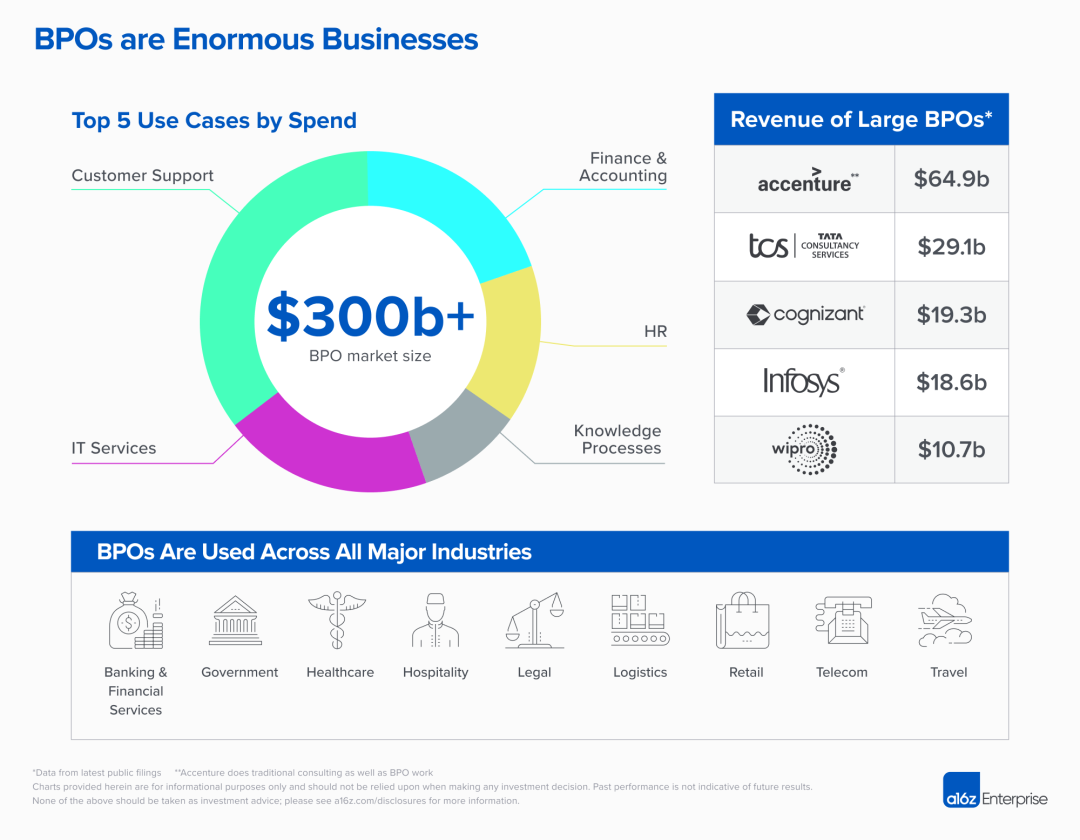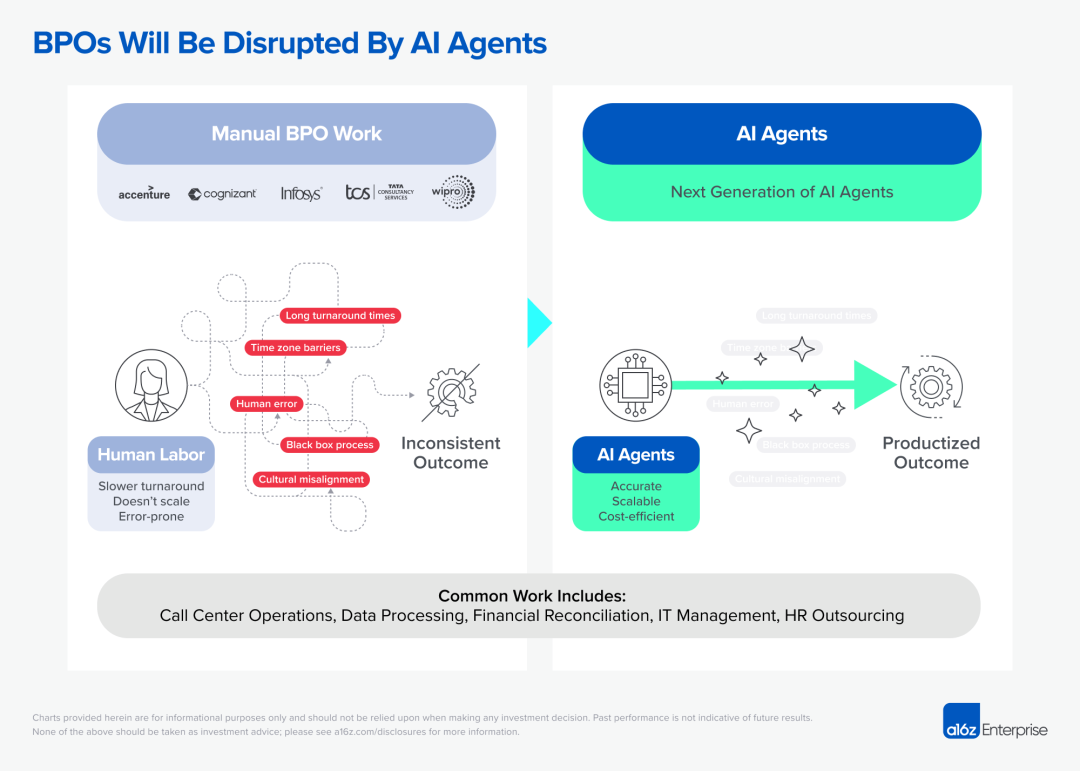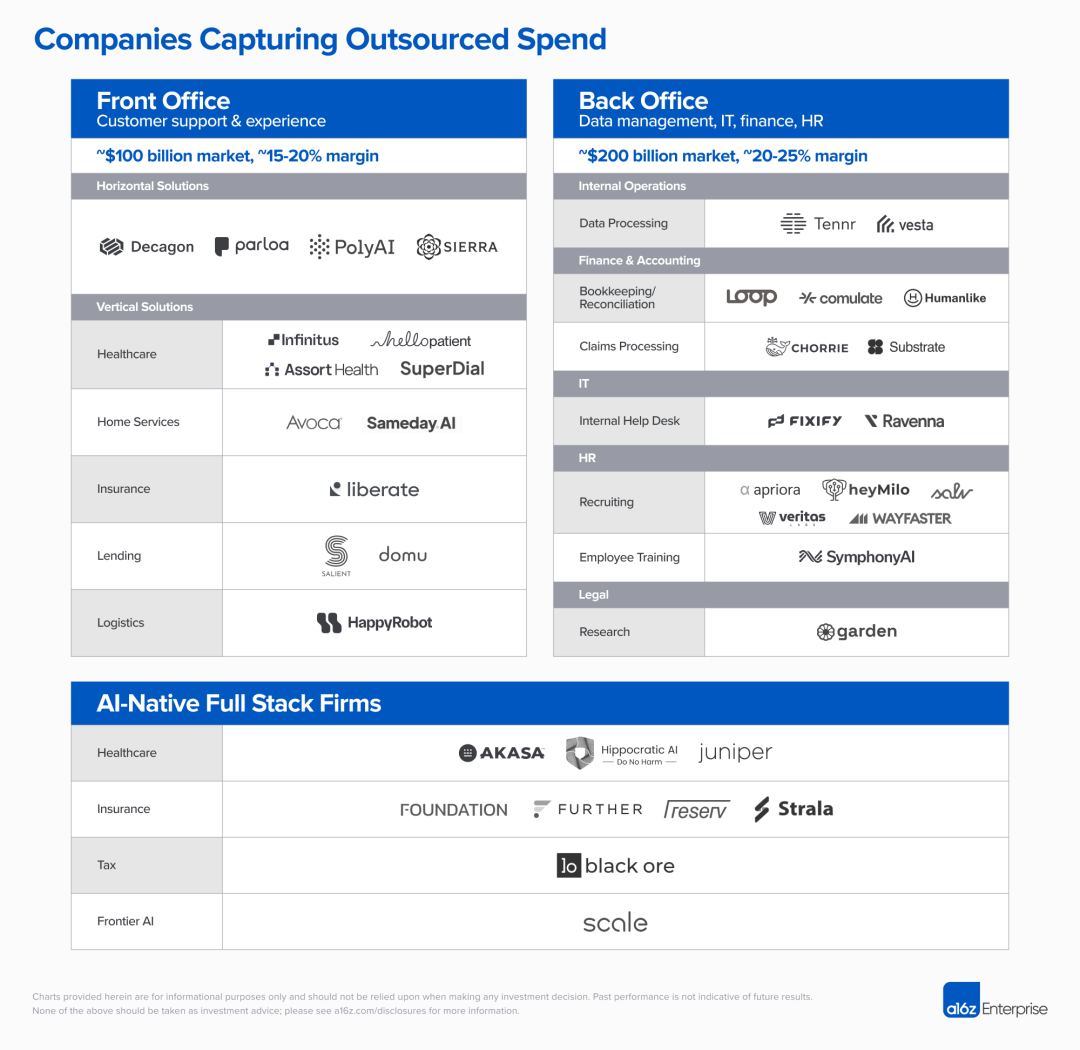Business Process Outsourcing (BPO) is a $300 billion industry that supports the back-end and front-end operations of the world's top 100 large enterprises.
Linkloud Introduction
Business Process Outsourcing (BPO) is a $300 billion industry that supports the back-end and front-end operations of the world's top 100 large enterprises.
In this episode, a16z podcast host Steph Smith dives deep into this transformation with partner Kimberly Tan, discussing everything from call centers and invoice processing to cross-system automation and R&D outsourcing. They explore how AI is redefining economies of scale, opening new markets, and extending the reach of automation beyond Fortune 500 companies to small and medium-sized enterprises. For entrepreneurs and business operators, this conversation provides clear insights for development planning in this newly ventured field. Enjoy!
In her article "Unpacking Business Process Outsourcing: How AI Will Disrupt Outsourced Work," Kimberly Tan thoroughly examines how the rise of AI challenges the status quo. Article link: https://a16z.com/unbundling-the-bpo-how-ai-will-disrupt-outsourced-work/
Key Takeaways:
The human-centric BPO model has inherent limitations; one person cannot handle 100 tasks simultaneously, and humans may produce misunderstandings and errors due to various external factors.
The best opportunities for startups are those scenarios with extremely clear ROI, typically involving functions with clear KPIs to evaluate work effectiveness.
The impact of AI on the BPO industry is not just about replacing existing manpower; it is also doing something more important: expanding the boundaries of the entire market.
The development of AI Coding does not directly seize existing BPO business but empowers end-users to solve problems themselves.
AI is Quietly Reshaping a $300 Billion Invisible Empire
As the wave of AI sweeps across the globe, while we discuss LLMs, AIGC, and those cool consumer applications every day, there is a vast and "invisible" industry being fundamentally reshaped by the power of AI. This industry is Business Process Outsourcing, commonly referred to as BPO.
- BPO: Ubiquitous Services
BPO services have already permeated every aspect of our daily lives. When we call bank customer service, communicate with airlines about tickets, or receive after-sales support from e-commerce, the person serving us on the other end of the line is likely from a BPO company.
Accenture, Tata, Wipro, Cognizant, Infosys—these globally renowned IT and consulting giants have a significant portion of their business landscape composed of BPO.
- The Core Essence of BPO: Reducing Burden for Enterprises
In simple terms, BPO occurs when a company reaches a certain scale and has a large number of non-core but essential business processes. Managing all of these internally becomes very complex and costly.
Therefore, companies choose to outsource these tasks to specialized agencies to achieve higher efficiency and scalability.
These tasks include not only the customer support and service we are familiar with but also a large number of invisible back-end functions, such as:
Outsourced HR
Financial accounting
Invoice processing
Knowledge management and research work
The Role of BPO: The "Lubricant" of the Modern Business World

This industry acts like the essential gears and lubricants in the vast machine of the modern business world, ensuring the smooth operation of the entire system. Its history is quite long, dating back to the 1940s when some companies began helping manufacturing enterprises manage their complex operational processes.
Today, it has deeply integrated into almost all major industries involved with Fortune 500 companies—retail, travel, telecommunications, logistics, manufacturing, healthcare, insurance, and banking.
This is a massive industrial ecosystem, with a current market value of $300 billion, expected to grow to an astonishing $500 billion or more by 2030.
Its continued growth itself indicates the enormous workload that large enterprises must complete to maintain their daily operations. However, this vast empire built on the foundation of "manpower" is now facing an unprecedented disruption. The force of this disruption is AI.
The Essence and Limitations of the Traditional BPO Model: Starting from "People"
To understand how profound the disruption brought by AI is, we first need to clarify the essence of the traditional BPO model and its inherent limitations.
Although BPO companies also provide services like strategic consulting or outsourced application development, our focus is on the most core business process outsourcing tasks executed by humans.
- Inherent Issues of the Traditional Model

The core of the traditional BPO model ultimately revolves around "people." Whether it's customer service representatives answering calls or accountants processing invoices, these tasks are ultimately completed by specific individuals.
This means that the efficiency, quality, and scalability of this multi-billion dollar industry are constrained by human limitations.
One of the most obvious issues is delays. A person cannot handle 100 tasks simultaneously. During peak times in customer support, users often have to wait a long time to connect with a human agent, an experience many can relate to.
Another issue is the potential for misunderstandings and errors. Humans, when handling repetitive, process-driven tasks, are prone to mistakes due to fatigue, emotions, or lack of experience.
Although companies outsource these tasks because they are not their core competencies or they do not want to expend energy managing them, this does not mean these tasks are being completed in the best possible state.
In fact, many companies are well aware of this, but for a long time, they have had no better options.
- Limitations of Traditional Software: Inability to Replace Human Cognitive Abilities
Why couldn't software solve this problem in the past? Because traditional software has a historical limitation: it excels at executing clearly defined, stable processes. It requires structured data input, clear rule instructions, and does not need to understand and judge in complex contexts.
However, most of the work handled by BPO falls precisely into the "forbidden zone" of traditional software.
For example, in a customer service scenario, you must truly understand what the customer is asking on the phone, whether their tone is anxious or confused. Similarly, when processing an invoice, you must be able to comprehend the content in different sections of the invoice, even if their formats vary widely.
Such work is filled with unstructured information and requires immediate judgment, which traditional software cannot handle. Therefore, the only solution is to invest a large amount of human labor to compensate for the shortcomings of software with human cognitive and judgment abilities.
This is the fundamental reason for the existence and development of the traditional BPO industry. It uses a "human wave tactic" to solve a problem regarding unstructured information processing and cognitive judgment that software cannot address. However, this solution also constitutes its greatest ceiling.
A New Paradigm Emerges: How AI Breaks the Shackles of Software
The emergence of AI does not simply optimize traditional software; it represents a fundamental paradigm shift. AI, especially LLMs, excels at addressing the issues that have troubled traditional software in the past.
It is highly adept at acquiring vast amounts of typically unstructured, variably formatted information scattered across different systems, then synthesizing, constructing, and understanding this information, ultimately outputting targeted actions based on this understanding.
- Voice AI: A Breakthrough from Zero to One
In this AI-led transformation, some technologies have already demonstrated incredible ROI, becoming pioneers in disrupting the BPO industry, while others signal a broader future.
Among them, the capabilities of Voice AI have achieved a decisive breakthrough from zero to one. We have all had terrible experiences dealing with traditional phone robots, getting lost in complex voice menus, or being repeatedly tortured by a rigid voice that completely fails to understand our intentions.
However, in the past few years, the technological innovations in Voice AI have been astonishing. Today, you may genuinely be able to have a natural conversation with an AI agent on the other end of the phone, to the point where you cannot distinguish whether the other party is a real person or AI at the beginning of the conversation.
These AI agents not only sound very human in their conversational abilities and tone, but the latency has also become very low, allowing them to respond at a normal human response speed.
More importantly, these AI agents can connect to the business systems of enterprises, allowing them to understand your background information during the call and provide faster and more accurate responses.
- Future Breakthroughs: The Potential of "Operator" Technology
If Voice AI is an application that has already been implemented, then another emerging technology suggests that AI will unlock a broader world of automation. This technology can be referred to as "Operator" or browser usage technology.
The core idea is to enable AI agents to work across various software systems and interfaces like humans, whether they are traditional desktop software, web applications, or custom systems within enterprises.
Soon, AI agents will be able to navigate these complex applications, not only retrieving information but also taking action. This means that tasks previously requiring human completion, such as those performed by data analysts or invoice processors, can be handled by AI in the future.
The New vs. Old Showdown in the Arena: Where Are the Opportunities for Startups?

Faced with such a massive transformation, traditional BPO giants like Accenture and Tata certainly won't choose to sit idly by. They deeply understand the opportunities brought by AI. For startups, there are indeed exciting windows of opportunity in the short term.
- This mainly stems from two core reasons:
First, there is a fundamental difference in business models. The business model of these traditional BPO giants is rooted in "labor," relying on a large organization of human resources to execute tasks.
For any large publicly traded company with annual revenues in the hundreds of billions, shifting core business from "people" to "AI products" is an extremely difficult and painful transition. This transformation is bound to be slow.
Secondly, many underestimate the practical difficulties of collaborating with these advanced AI systems. You need to invest a significant amount of work to ensure that AI does not produce "hallucinations," establish an evaluation system to assess the response quality of AI agents, and determine when and how to replace the underlying models.
You must be a truly AI-native technical founder to deeply understand how to navigate these complexities, and this is still far from being a widely distributed skill today.
- High ROI Scenarios: Excellent Opportunities in Customer Support
Thus, the best opportunities for startups are those scenarios with extremely clear ROI, typically involving functions with clear KPIs to evaluate work effectiveness.
Customer support is an excellent example. Its KPIs are very clear: how many tickets can be processed within a certain time frame, and the satisfaction score of end users after task completion (CSS).
You can clearly demonstrate the value of AI agents with data. In contrast, some areas have much vaguer KPIs, such as HR. Of course, this also requires more work to persuade companies to quantify the value of an AI HR assistant.
Moreover, AI is not omnipotent; there will always be some very long-tail, extremely complex, or special issues that require human wisdom to handle, which means that successful business models must consider who will handle these long-tail tasks that AI cannot solve.
Expansion and Creation: AI is Not Only Reshaping but Also Opening New Markets
The impact of AI on the BPO industry is not just about replacing existing manpower; it is also doing something more important: expanding the boundaries of the entire market.
In the past, BPO services were primarily prepared for large enterprises with sufficient budgets. The emergence of AI solutions allows small and medium-sized enterprises that have never engaged with BPO to enjoy such services.
For example, a small to medium-sized e-commerce company may have previously been unable to afford the cost of a 24-hour customer service team, but now, by deploying an efficient AI customer service agent, they can actually provide around-the-clock support to their customers at a very low cost.
In the short term, this model may not directly impact the core business of large BPO companies, as these small and medium-sized enterprises were not their target customers to begin with. This is akin to opening up a whole new incremental market.
However, in the long run, if these startups providing AI solutions grow alongside their clients and gradually target larger customers, they will ultimately have a profound impact on the existing market landscape.
- AI Enhancing Value for Existing BPO Clients
For companies already using BPO services, AI is also helping them expand the range of services they can cover.
In the past, a company might only provide human support for its core product line, but now, with the help of AI, they can extend high-quality customer service to every corner of their entire product line.
A good way to identify these best opportunities is to look for operational tasks that "scale linearly" as the company grows. This means that the cost of this work will increase proportionally with the growth of the company's business.
The more customers you acquire, the more customer support requests you will have; the larger your business scale, the more invoices you need to process. If you can provide an AI solution that flattens this steep cost growth curve or even reduces it, that represents an extremely clear and irresistible value proposition for the company.
When AI Makes Everyone a Developer
Much of the work done by large BPO companies involves not only outsourcing business processes but also outsourcing IT or application development. They may also build small internal tools or applications for companies that lack internal IT or engineering resources.
While building a complete application is much more complex than responding to a customer inquiry, a larger trend is that AI Coding Agents are becoming increasingly capable.
The development of this technology will empower those who may not be very technical or even completely lack a technical background to build the complete applications they need.
This will effectively become a very interesting "orthogonal attack vector" targeting the BPO industry. Its disruptive approach is not to directly seize the existing business of BPO companies but to empower end-users, enabling them to solve problems themselves, thereby making the demand for "outsourcing" disappear in certain scenarios.
It is difficult to quantify what this will mean in the next two to three years. However, one can imagine the kind of transformation that will occur when you truly enable a whole new group of people to build their own applications. This is not just a reshaping of an industry; it is a liberation of the way work is done and creativity itself.
免责声明:本文章仅代表作者个人观点,不代表本平台的立场和观点。本文章仅供信息分享,不构成对任何人的任何投资建议。用户与作者之间的任何争议,与本平台无关。如网页中刊载的文章或图片涉及侵权,请提供相关的权利证明和身份证明发送邮件到support@aicoin.com,本平台相关工作人员将会进行核查。




